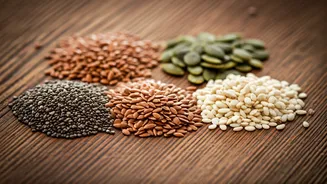Introduction to Seeds
Seeds, often underestimated, are packed with essential nutrients that contribute significantly to overall health. When it comes to heart health, certain
seeds stand out for their ability to lower bad cholesterol (LDL) and improve the lipid profile. They are also sources of fiber, which helps bind cholesterol in the digestive tract, preventing its absorption. Seeds are also rich in antioxidants, which protect the heart from damage. Further, they are incredibly easy to incorporate into meals and snacks, offering a simple way to boost health.
Flaxseed's Cholesterol Fighter
Flaxseeds are at the top of the list for cholesterol reduction. They contain a high amount of soluble fiber, which helps to bind cholesterol in the digestive system, preventing its absorption into the bloodstream. They are also packed with omega-3 fatty acids. Studies have shown that consuming flaxseeds can significantly reduce LDL cholesterol levels. Include flaxseeds by grinding them and adding them to smoothies, yogurt, or sprinkling them on cereal. A daily intake of about 1-2 tablespoons can be beneficial for heart health.
Chia Seeds' Heart Benefits
Chia seeds are small but mighty, providing a wealth of nutrients beneficial for heart health. They are, like flaxseeds, a great source of soluble fiber, which plays a major role in lowering cholesterol. Chia seeds are a good source of omega-3 fatty acids, which also contribute to heart health. They also have antioxidants, which shield the heart from oxidative stress and damage. Incorporating chia seeds into the diet is easy; they can be added to water, absorbed into puddings, or used as a topping on various meals. Adding approximately 1-2 tablespoons per day can make a difference in heart health.
Hemp Seeds' Advantages
Hemp seeds are known for their balanced ratio of omega-3 and omega-6 fatty acids, beneficial for reducing cholesterol levels and promoting heart health. These essential fatty acids are crucial in reducing inflammation and supporting overall cardiovascular function. Hemp seeds are a complete protein, containing all nine essential amino acids. They contain arginine, an amino acid that converts to nitric oxide, which helps relax and dilate blood vessels, supporting healthy blood pressure. Adding hemp seeds to your diet is simple: sprinkle them on salads, add them to smoothies, or use them as a topping for yogurt and other meals. Aim for about 2-3 tablespoons daily to reap the benefits.
Pumpkin Seeds: Zinc Power
Pumpkin seeds are a good source of zinc, which is known to play a role in cardiovascular health. They are rich in antioxidants, including vitamin E, which protects against oxidative stress that can damage blood vessels. These seeds also contain phytosterols, compounds that can help reduce LDL cholesterol. Magnesium, another key component, helps regulate blood pressure. Pumpkin seeds are great for snacking or can be added to salads and trail mixes. Consuming about a quarter of a cup of pumpkin seeds daily can provide these benefits.
Sesame Seeds' Role
Sesame seeds contain lignans, which have been shown to help lower cholesterol levels. They also provide copper, manganese, and calcium, all essential for heart health. Sesame seeds support healthy blood pressure because of their high magnesium content. They also have antioxidants that protect the body against free radical damage. Sesame seeds can be added to stir-fries, sprinkled on salads, or used to garnish various dishes. Consuming about 1-2 tablespoons per day of sesame seeds can contribute to improved heart health and overall cardiovascular well-being.



















